Uncategorized
Turkey Expands Regional and Global Ambitions, Raising Alarm Bells in Israel

Turkey’s President Recep Tayyip Erdogan speaks during a joint statement to the media in Baghdad, Iraq, April 22, 2024. Photo: AHMAD AL-RUBAYE/Pool via REUTERS
Turkey is rapidly expanding its regional and global influence — strengthening ties with Syria, Lebanon, Iran, and the Gulf states, while pressing for a role in post-war Gaza — a trend that is raising alarm bells in Israel and the broader region amid shifting Middle East power dynamics.
As part of its push to expand regional influence and strengthen strategic partnerships, Turkey has recently signed a memorandum of understanding with Syria, expanding their military cooperation to cover training, advisory support, and access to weapons systems and logistics.
On Thursday, Turkey’s Defense Ministry announced that Syrian armed forces have begun training at Turkish facilities and will also attend the country’s military academies, as both nations seek to deepen their defense ties.
Turkey’s push to expand its ties with Syria comes as the latter is reportedly in the final stages of negotiations with Israel over a security agreement that could establish a joint Israeli–Syrian–American committee to oversee developments along their shared border and uphold the terms of a proposed deal.
Ankara has also been working to establish closer diplomatic and military relations with Israel’s other northern neighbor, Lebanon, at a time when the country stands on the brink of renewed conflict with the Jewish state.
Amid mounting international pressure, the Lebanese government is intensifying efforts to meet the ceasefire deadline to disarm the terrorist group Hezbollah, while trying to avoid plunging the nation into a civil war.
As the Iran-backed terrorist group continues to refuse disarmament, Turkey is leveraging the opportunity to bolster its regional influence and expand its alliances.
Last week, Turkey’s Defense Ministry confirmed that the country’s peacekeeping forces would continue to support the Lebanese army in its mission to restore stability and peace.
“Ongoing efforts will focus on enhancing security in the region, promoting stability, and supporting the development of the Lebanese armed forces, with the goal of fostering and sustaining peace in Lebanon,” Turkish officials announced, following the approval of a two-year extension to their mission in Beirut.
Turkish President Recep Tayyip Erdogan – who has been openly hostile toward the Jewish state for years – has repeatedly condemned Israeli offensives targeting the Iranian proxy and its terrorist operations in Lebanon.
He has previously said that Israel’s “genocidal” and “expansionist” policies remain the biggest threat to regional peace.
Ankara has also been working to expand its regional influence in the Gaza Strip, which borders Israel to the south, positioning itself to play a pivotal role in post-war developments under the US-backed peace plan.
However, experts warn that Turkey’s growing involvement in the enclave’s reconstruction efforts could potentially strengthen Hamas’s terrorist infrastructure and undermine the fragile ceasefire.
As one of the biggest backers of Hamas, Turkey could potentially shield the Islamist movement in Gaza or even bolster its power, especially as the Palestinian terrorist group continues to reject disarmament — a key element of US President Donald Trump’s peace plan.
In the past, Ankara has provided refuge to Hamas leaders, granted diplomatic access, and allowed the group to fundraise, recruit, and plan attacks from Turkish territory.
Under Trump’s plan, Turkey has sought to join a multinational task force responsible for overseeing the ceasefire and training local security forces.
Erdogan declared that the country is “ready to provide all kinds of support to Gaza,” and insisted that the Turkish Armed Forces “could serve in a military or civilian capacity as needed.”
However, Israeli officials have repeatedly rejected any involvement of Turkish security forces in post-war Gaza.
Israeli Prime Minister Benjamin Netanyahu has stated that Turkey’s participation in the International Stabilization Force would be out of the question, labeling it a “red line.”
Gulf states have also raised concerns about Turkish and Qatari involvement in Gaza’s post-war reconstruction and governance efforts.
While the Trump administration has ruled out sending US soldiers into the war-torn enclave, Washington has also considered involving Indonesia, the United Arab Emirates, Egypt, and Azerbaijan in the international peacekeeping efforts.
US officials have confirmed that any participating countries in the international task force will be selected in close coordination with Israel, ensuring that no foreign troops will be included without Israel’s consent.
Despite Turkey’s efforts to advance its regional ambitions in the enclave and secure a role in post-war Gaza, Erdogan continues to attack Israel while defending the Palestinian terrorist group, as he has repeatedly in the past.
He has frequently defended Hamas terrorists as “resistance fighters” against what he describes as Israeli occupation of Palestinian land. He has even gone so far as to threaten an invasion of the Jewish state and called on the United Nations to use force if Jerusalem fails to halt its military campaign against Hamas.
On Thursday, Erdogan reiterated his anti-Israel rhetoric, targeting Germany for its alleged indifference to what he called Israel’s “genocide, famine, and attacks” in Gaza.
In a joint press conference with his German counterpart, the Turkish leader said that it is the international community’s duty to end what he described as famine and massacres in Gaza.
ERDOĞAN: “HAMAS HAS NO BOMBS – ALL THESE WEAPONS ARE IN ISRAEL’S HANDS”
“Hamas has no bombs, no nuclear weapons. But all these weapons are in Israel’s hands.
And Israel, using these weapons, for example just last night, again struck Gaza with these bombs.
Don’t you see… https://t.co/Z5eDHq1exW pic.twitter.com/LoKHNHUIvC
— Mario Nawfal (@MarioNawfal) October 30, 2025
Ankara’s regional ambitions have led the country to expand bilateral ties with Iran, seeking closer cooperation on political, economic, and security matters.
This week, Iranian and Turkish officials pledged to deepen their ties during high-level talks in Tehran — a move likely to raise further alarm bells, given both countries’ longstanding role of supporting Islamist terrorists and their hostile stance toward the West.
In a message to his Turkish counterpart, Iranian President Masoud Pezeshkian stressed the importance of deepening mutual cooperation to strengthen security, development, and stability for both countries and the region.
Ankara has also engaged with Saudi Arabia in an effort to strengthen bilateral ties and secure Riyadh as a regional partner amid shifting power dynamics in the Middle East.
On Wednesday, Turkey’s ambassador to Saudi Arabia, Emrullah Isler, praised the growing defense cooperation between the two countries, including joint training and other initiatives, amid the signing of new agreements.
Turkey and Saudi Arabia “are key regional actors that share a commitment to peace, stability, and international law,” Isler wrote in a post on X.
“As reaffirmed by both countries during various high-level meetings, we are confident that our military cooperation will continue to grow in terms of both scope and depth,” he continued.
As part of Turkey’s push to expand its influence across the Middle East, Erdogan set out last week on a diplomatic tour to Qatar, Kuwait, and Oman.
During this official tour, he aimed to secure new trade, investment, energy, and defense deals, while also seeking regional support for his proposal to deploy Turkish troops in Gaza.
But Turkey’s efforts to boost its regional influence have also extended beyond the Middle East.
On Thursday, when Erdogan met with German Chancellor Friedrich Merz, they discussed regional developments and exploring opportunities to strengthen their bilateral cooperation.
At a joint press conference, Merz described Turkey as a key partner for the European Union, noting that Berlin aims to help Ankara expand its relationships with other EU member states.
“I personally, and the German government, see Turkey as a close partner of the European Union. We want to continue smoothing the way to Europe,” the German leader said.
Uncategorized
The dark message behind Tucker Carlson’s attempt to drum up drama in Israel
Tucker Carlson’s visit to Israel lasted only a few hours — not long enough to experience the country, but sufficient to stage a performance.
Carlson claimed he had experienced “bizarre” treatment at Ben Gurion Airport, a description that Israeli and U.S. officials dismissed. What actually happened: He underwent routine security questioning on his way to interview United States Ambassador Mike Huckabee.
In Israel, Carlson’s outrage was widely received with a mixture of indifference and eye-rolling. But Israelis with their ears to the ground understood that his attempt to stir the pot means they have a problem brewing in American public opinion — and a more immediate problem with public relations.
Because Carlson’s airport drama was never about Israeli airport procedures. It was about American politics, an arena in which Carlson has built a lucrative post-Fox career selling a particular worldview: one suspicious of alliances, contemptuous toward interventionism, and invested in the conspiratorial belief that shadowy forces distort American sovereignty.
Israel, in this rhetorical universe, functions as a convenient prop in a broader narrative of elite manipulation and national victimhood.
Carlson and Huckabee, the man he traveled across the world to interview, now personify two increasingly incompatible strains of MAGA politics. Huckabee represents something recognizable to mainstream conservatives: he’s traditionalist, evangelical, instinctively pro-Israel and broadly aligned with America’s historical posture as a global power.
Carlson speaks, instead, to a newer faction defined by nationalist retrenchment, hostility to foreign entanglements, and an often startling indifference to liberal democratic norms. He has been scathingly critical of U.S. support for Israel in its war with Hamas and has backed far-right conspiracy theories about whites being “replaced” by people of color. And when he attacks evangelicals like Huckabee for supporting Israel too much, there is extra value in the antisemitic dog whistle for the white supremacists with whom he is popular.
Call it deep MAGA: a coalition that regards alliances as burdens, admires strongmen — including and especially Vladimir Putin — and deeply disdains anyone who cares about democratic values and their promotion around the world. This large and growing constituency within American conservatism is eager for narratives that recast foreign policy debates as struggles against manipulation rather than disagreements over strategy. And Israel fits neatly into that story.
Carlson’s brief airport encounter was therefore not a journalistic episode, but content generation. The grievance was the product.
Nothing about the incident requires serious factual dispute to achieve its purpose. Its value lies in symbolism, not accuracy. Whether Carlson genuinely subscribes to every element of this worldview is, at this point, almost irrelevant. His extraordinary success after leaving Fox News suggests he understands his audience perfectly. He is not drifting toward obscurity by embracing this kind of stunt; he is responding to market demand.
In doing so, he is illustrating a story about a Republican Party negotiating an identity crisis.
President Donald Trump, widely seen in Israel as a huge friend, is not a reliable ally. If the wing behind Carlson becomes clearly stronger than that behind Huckabee, there’s no telling whether he would hew to their demands. His loyalties are famously contingent, and he has shown little hesitation in entertaining figures once considered radioactive within mainstream Republican politics.
In a movement defined by power, primacy will belong not to the most coherent worldview but to the most electorally useful one.
For Israel, the implications are uncomfortable. The country has long relied on the assumption that American support is both durable and bipartisan. Prime Minister Benjamin Netanyahu badly upset that applecart by so clearly aligning himself with the Republican Party at large, and Trump specifically.
In growing sections of the progressive left, Israel is framed as a colonial antagonist, and Israel’s support on the Democratic side of the public is in free-fall. On parts of the populist right, it is cast as an entangling liability or worse. The political center sustaining the relationship is shrinking.
Carlson did not invent this shift. But he is capitalizing on it. Netanyahu’s outrageous behavior — including his alignment with the fascist underbelly of Israeli politics and ennabling of the ultra-Orthodox establishment — is causing a rift with U.S. Jews, and giving pundits like Carlson tailwind.
If a media entrepreneur of Carlson’s sophistication believes there is a vast audience for rhetoric that treats Israel as suspect, burdensome, or undeserving of American backing, Israeli policymakers would be unwise to dismiss the signal.
Carlson’s Ben Gurion theatrics were undeniably entertaining. What they reveal about the trajectory of American politics — and Israel’s place within it — is rather less amusing.
The post The dark message behind Tucker Carlson’s attempt to drum up drama in Israel appeared first on The Forward.
Uncategorized
Rediscovering the ‘Dybbuk’ composer Henokh Kon
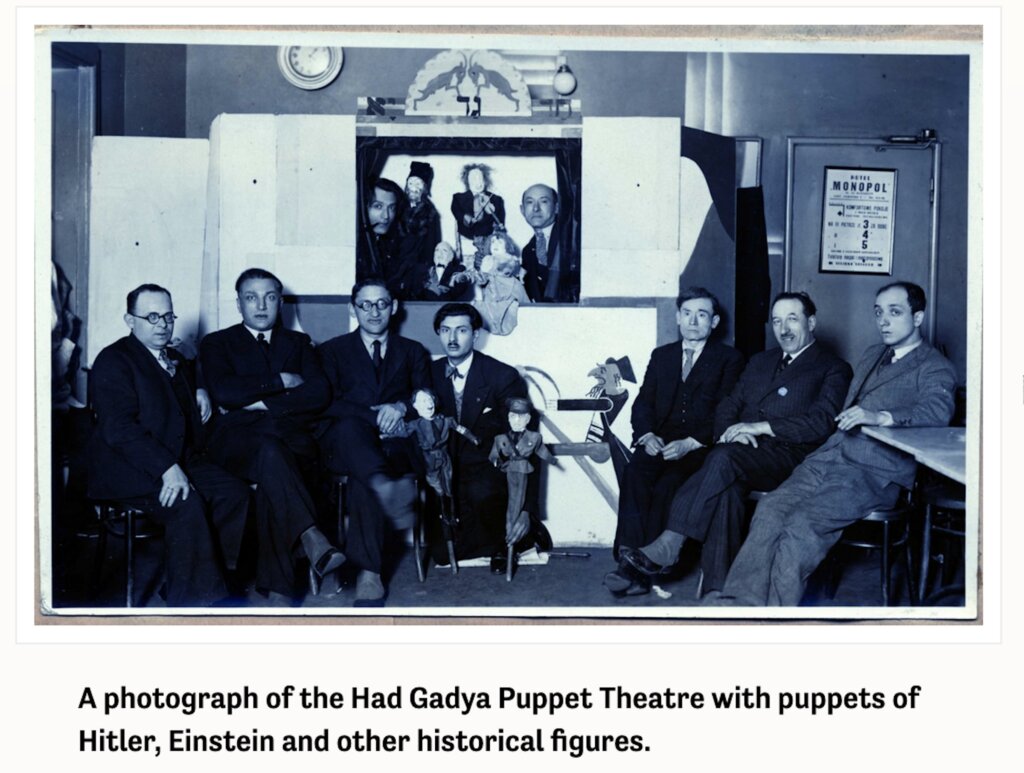
When the 1936 Polish Yiddish feature Al Khet (I Have Sinned) screened at the New York Jewish Film Festival last month after a decades-long restoration process, seeing the film was cause for celebration.
Hearing the soundtrack was my greatest joy. It was scored by one of my favorite Yiddish composers, Henokh Kon, who created the music for the 1937 film classic The Dybbuk. In his heyday between the world wars, Kon was already renowned as a prolific creator of catchy songs and sophisticated multi-genre instrumental repertoire, even years before his first film commissions.
My ears perk up for Kon’s distinctive, eclectic sound textures (as well as ingenious folk-stylized song repertoire) — from the iconic dance sequences of The Dybbuk, to angst-driven passages in the Bundist quasi-documentary Mir Kumen On (called Children Must Laugh in English), to darkly ironic background cues for the low-budget Freylekhe Kabtsonim (Jolly Paupers).
I heard a signature sonic palette: Brightly dissonant chords, off-kilter rhythmic patterns on moody drums, frantic flurries of plucked violins, haunting exotic double-reed instrumental leads (played by the oboe’s English horn cousin, or by bassoon) alternating with more klezmer-standard clarinet, flute or fiddle.
Kon soundtracks often juxtapose traditional Jewish modal scales with more angular chromatic passages. An opening scene in Al Khet features a lovely subdued range of his orchestration punctuated by a triangle chiming downbeats as though to clarify the air during a montage of shtetl vistas. Later in the film, Kon crafts a vibrant, sultry tune for Ruth Turkow (the real-life daughter of actor-directors Zygmund Turkow and Ida Kaminska) to sing from her parlor keyboard: “Zing zhe mir a lidele” (“Sing me a little song”) with a tango lilt.
I admire Kon the alchemist, infusing Hasidic melodies with both modernist expressionism and baroque techniques, as well as Kon the entertainer, gifted at popular singable hits. (He also set “Yosl Ber” — a humorous song about a Jewish soldier — and even led a jazz band for a secular New Year’s Eve Jewish ball.)
Kon was equally in demand for dramatic and satirical stage projects in an ever-shifting constellation of visionary writers, artists, production teams and performers that propelled Yiddish cultural movements of the 1920’s and ’30s.
Like many artists involved in interwar Jewish Poland’s kleynkunst (cabaret-style entertainment) and experimental performance scenes, Kon had himself grown up “between two worlds” (which, by the way, was the original title of the Dybbuk author An-sky’s groundbreaking play). Born in 1890 into a religious household in the Polish industrial city of Lodz, Kon was sent at age 12 to live with his grandfather, a rabbi in Kutno, since his family hoped the boy would become a yeshiva scholar.
Instead, intrigued by listening to klezmer musicians and badkhns (wedding entertainers), Kon followed a more creative path, and was sent as a teenager to Berlin to study at a royal music academy for several years. But homesickness for his Jewish roots led him back to Poland.
Arriving in Warsaw in 1912, he found creative encouragement and connections through the literary salons hosted by the classic Yiddish writer Y.L. Peretz and the Yiddish playwright and actress Tea Arciszewska. Peretz insisted that Kon compose settings for his poetry, and later Kon scored the premiere of Peretz’s groundbreaking expressionist stage play A Night in the Old Market.
In the cultural upheaval and ferment following WWI, Kon garnered various commissions from the Vilna Troupe, but more regularly partnered with the charismatic writer and impresario Moishe Broderzon for a series of collectivist performance projects, often with a leftist political edge.
All these productions used titles referring to radically reimagined Jewish culture. Their popular 1922 puppet parody company “Khad Gadye” — a Passover reference — was followed in 1924 by their ambitious yet low-budget, biblically-based modernist opera Bas-Sheve (Bathsheba, King David’s lover and future wife). When a lead singer fell ill, Kon sang his bass part from behind the piano.
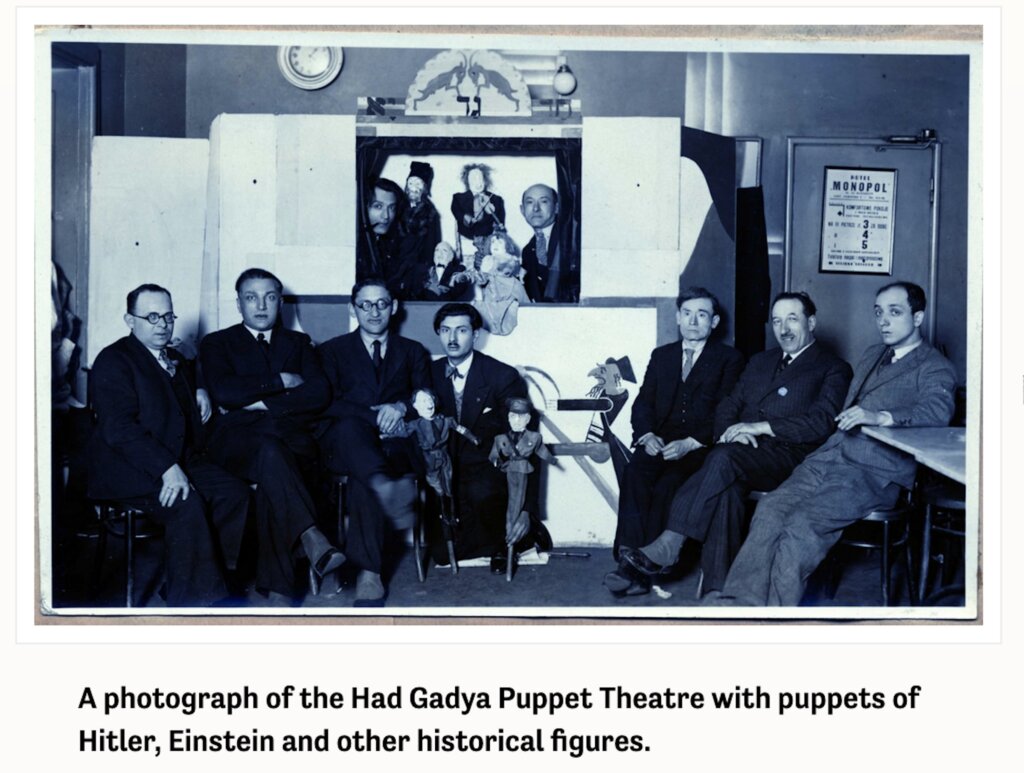
Two visionary variety-show format “revue” theater collaborations by Broderzon and Kon came next. The first collaboration was the mid/late 1920’s variety theater collective Azazel (Scapegoat), famously rhyming with shlimazel which you hear in Broderzon and Kon’s “Azazel Shimmy” — a song that all of Jewish Warsaw used to hum. The Yiddish actress and playwright “Totshe” Arciszewska, whom Kon knew before WWI, was another key player in this group.
Broderzon next established the theater collective Ararat, the acronym for the Artistic Revolutionary Revue Theater, but also referring to Mt. Ararat, the place where Noah’s ark landed after the flood, signifying a fresh start.
Through the legendary 1930’s Ararat kleynkunst ensemble, Kon became well-acquainted with several cultural figures he would also soon write for in celluloid format. Dzigan and Schumacher, the comedy duo, first known to Polish-Yiddish audiences through live shows with Ararat, played supporting roles in the film Al Khet, adding humor to the screen melodrama.
The following year the pair starred in Freyklekhe Kabtsonim, scripted by Broderzon, the same guy who had discovered them.
Most significantly for Kon himself, the dancer Judyta [Judith] Berg joined Ararat. Kon encouraged her choreographic innovations, accompanying her solo dance concerts and using his established celebrity to draw elite Warsaw audiences for her in 1934. By the time the prestigious cinematic version of The Dybbuk was cast, Berg was not only recruited as choreographer, she also performed in white skull mask and tallis for the toytn-tants (Dance of Death) accompanied by Kon’s evocative music, the indelible Dybbuk scene for which she and Kon are best known. Kon and Berg became a romantic couple as well, though it’s not clear whether they ever married.
Like Kon, Berg had grown up influenced by Hasidic culture around her and then studied in Germany. At various Jewish celebrations, her grandmother led women’s dancing and told Judith about older traditional dance forms like the toytn-tants, while her brother would hold open the door so she could watch the men’s group dancing.
Later Berg went to Dresden, Germany, for intensive classes with modern dance pioneer Mary Wigman. (During the rise of Hitler, Judith and other Jewish dance students left Wigman’s school and Germany altogether.) In the late 1930’s, she and Kon escaped the Nazis separately, but Berg’s niece Yvette Metral told me she recalled seeing Kon once in 1948-49 when he came to visit her aunt at the dance school Berg established for Jewish survivor children in Wroclaw.
Kon’s legacy is being rediscovered in numerous recent cultural explorations. “Bas-Sheve,” the opera he wrote with Broderzon, was performed in 2019 at Yiddish Summer Weimar, based on a rediscovered partial piano score, with major arranging and re-imagining by klezmer performer Josh Horowitz and added libretto portions devised by the writer and Yiddish translator Michael Wex. This piece will soon be performed again by the UCLA Symphony.
Also in recent years, much research and revival effort has focused on two works that Kon composed for the avant garde leftist theater troupe Yung teater, both based on landmark American trials which galvanized political movements. One composition, called “Boston,” is about Sacco & Vanzetti, and the other, “Mississippi,” is about the Scottsboro Boys. Small wonder that a quote from the leftist anthem “Internationale” found its way into Kon’s score for Mir Kumen On (the Bundist film already under threat by Polish censors).
Last December brought us the diasporic Yiddish puppet show The Trial of Modicut, directed by Yael Horowitz, who gave a conference presentation on Kon, Broderzon and their Azazel Shimmy in 2025. Splendid music for the Modicut show was performed by the duo of Raffi Boden (cello/music director) and Ira Temple (accordion), which at one point featured a gorgeous adaptation of one of Kon’s most recognizable orchestrated Dybbuk motifs, graced by a fluffy puppet sheep.
While my musician friends who took part in the puppet show seemed unaware of the composer’s name, the spirit of his creation lives on in their fusion of conservatory training, deep klezmer chops, respect for cultural ancestors and antic humor aimed at serving the creative proletariat.
Eve Sicular is a cinema scholar, co-curator of the Yiddish New York Film Festival and a former curator of film & photo archives at YIVO Institute. She is also the drummer/bandleader for Metropolitan Klezmer & Isle of Klezbos whose latest album is “Yiddish Silver Screen.”
The post Rediscovering the ‘Dybbuk’ composer Henokh Kon appeared first on The Forward.
Uncategorized
She’s a Democratic Socialist who affirmed Israel’s right to exist. Can she be LA’s next mayor?
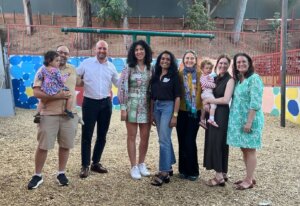
LOS ANGELES – City Councilmember Nithya Raman won the backing of two very different organizations the last time she ran for office. One of them was Democrats for Israel Los Angeles, a liberal Zionist group. The other was perhaps the most overtly anti-Israel collective in town — the local chapter of Democratic Socialists of America. Raman’s politics divided both groups, but the unconventional coalition helped lift her to re-election.
Two years later, Raman hopes to recapture that broad appeal in her bid to be the city’s next mayor. The 44-year-old DSA member, who represents parts of the San Fernando Valley, Hollywood and Silver Lake, surprised her colleagues and incumbent Mayor Karen Bass earlier this month with her late entry into the June 2 primary race. And while political observers on both coasts have noted her similarities to New York City Mayor Zohran Mamdani, whose 50,000 campaign volunteers drew from a slew of progressive groups, Raman hopes her tenure on city council — and the Jewish allies she’s made along the way — can attest to the differences.
“Mamdani is clearly a very popular politician, and so to be compared to a popular politician who is very good at communication — it’s a good thing,” Raman told the Forward in a phone interview. “I will also say that I am my own person, and I have a record of service here — five years of service to the city and to my district that clearly lay out who I am, how I have governed, and my approach.”
Raman’s relationship with DSA is something of a rocky symbiosis. In 2020, she became the first member of the movement to win a seat on LA’s city council, with left-wing grassroots organizers helping turn out a record number of voters to defeat an incumbent. Raman has since broken with DSA on votes and in public comments, on both Israel-related issues — for one, she does not support the Boycott, Divest and Sanctions movement — and municipal ones. Yet even as three other DSA members have joined her on city council — and another, Rae Huang, runs for mayor — Raman remains the chapter’s biggest star as well as its strongest candidate in the race.
Her community outreach and her openness to engaging on Israel and antisemitism have endeared her to some Jewish voters in LA’s 4th council district, and she won re-election in 2024 despite a redistricting that largely subtracted the progressive base that put her in office. She touts her second victory as proof of her broadly effective governance. But some Jewish constituents remain ambivalent about or opposed to Raman due to politics they deem insufficiently pro-Israel or because of her affiliation with DSA.
Interviews with 10 local Jewish leaders, including five who live in her district or whose institutions predominantly serve her constituents, underscored both the inroads Raman made with Jewish communities during her tenure and the difficulty she may have winning over voters citywide. (The top two primary finishers advance to a November runoff if no candidate receives a majority of the vote.)
“I know if I had a need, she would take my phone call and would do her best to be of assistance,” said Rabbi Sarah Hronsky, who leads Temple Beth Hillel, a Reform synagogue located just outside her district in Valley Village. “I think she genuinely cares about humanity. I just don’t think it is very clear to the Jewish community where she stands on the topic of Israel, and where she stands in terms of the increase in antisemitism.”
Those positions are well documented, and in some cases Raman has volunteered them. And though they were a wedge issue inside DSA, they also offer a point of departure from Bass, an establishment Democrat whose handling of Jewish issues — especially on anti-Israel protests — has been called into question.
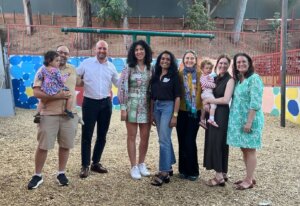
Building a track record — and Shabbat-friendly crosswalks — in Jewish areas
Even as Raman, a Harvard-educated urban planner, soared from obscurity into office in 2020 on a groundswell of progressive activism, she did not neatly map onto DSA politics.
The national organization calls for an end to U.S. aid to Israel in its national platform, and the 90% of the LA chapter — some 2,000 dues-paying members, according to one longtime organizer — voted in 2017 to endorse the Boycott, Divestment and Sanctions movement. Raman, with DSA’s endorsement already in hand, took a softer tack that summer on a Democrats for Israel questionnaire. In a written response, she affirmed Israel’s “right to exist” and said she did not support BDS, though adding her view that such efforts are protected by the First Amendment.
“I personally am deeply upset by policy decisions in India, my own country of origin, and while I have not participated in a boycott, I understand the argument for withholding economic activity,” she wrote. (Raman moved to the U.S. when she was 6.)
With Raman an outsider candidate for the council seat and not favored in the election, the responses attracted little attention outside of DSA. She eventually won in an unusually shaped jurisdiction that included Jewish and Israeli neighborhoods like Hancock Park and Sherman Oaks and young, progressive pockets like Koreatown and Silver Lake.
“I don’t think she’s afraid to diverge from the points of view of the DSA.”
Gregg SolkovitsPresident, Democrats for Israel Los Angeles
Once in office, Raman became a regular guest at Jewish community functions in and around her district. She joined Stephen Wise Temple for High Holiday services and the Silver Lake JCC for a Passover seder. Hronsky noted that Raman often stayed for the nearly two-hour duration of Valley-wide “Shabbat in the Park” gatherings, rather than the perfunctory photo-op-and-handshakes some might expect of a busy politician.
“When I ran, I actually didn’t know that this would be such a big part of my job,” Raman told the Forward. “But it’s been really good to be able to be a small part of the bigger Jewish community.”
Outside Chabad of Sherman Oaks, she helped push through the addition of a timed traffic signal that enabled Orthodox Jews to cross a busy thoroughfare on Shabbat — an improvement the synagogue’s rabbi, Mendel Lipskier, said he had sought for more than a decade.
The Hamas-led Oct. 7, 2023, attacks, in which around 1,200 people in Israel were killed and another 250 taken hostage into Gaza, thrust her connection to DSA into the spotlight.
That day, as Raman issued a statement “condemning the horrific violence by Hamas and praying for a peaceful end to this conflict,” the national DSA in its statement called the massacre a “direct result of Israel’s apartheid regime.” Raman, who had attended an Oct. 9 vigil at Stephen Wise, soon released a longer second statement in which she rejected DSA’s missive as “unacceptably devoid of empathy.”
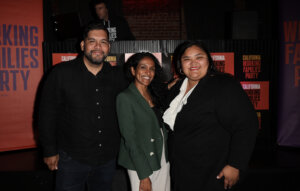
Split constituencies
Her politics continued to defy easy categorization as the war in Gaza wore on. During a temporary ceasefire in November 2023, Raman adjourned a session of city council by memorializing the 11,000 Palestinians who had reportedly died to that point in Gaza. “My pain is unspeakable,” she said, closing the message by calling for “urgent action to stop these civilian casualties and bring the hostages home.”
The following June, she introduced a municipal resolution calling for an immediate ceasefire and release of hostages. The resolution, which never reached a vote, was slammed by the local Jewish federation and other mainline Jewish groups as “fostering hostility toward the Jewish community.” (The federation declined to comment for this article.)
The ceasefire calls put her at odds with much of her Jewish constituency, which leans heavily pro-Israel. One Jewish leader said his synagogue, which serves many of her constituents, had had to keep Raman at arm’s length because not declaring Hamas entirely responsible for the devastation in Gaza meant Raman failed some congregants’ pro-Israel litmus test.
Yet as her term wound down, Raman found the support of DFI-LA, a Democratic Party club that considers local Jewish issues in addition to candidates’ stances on Israel. Gregg Solkovits, the organization’s president, said the combination of Raman’s public statements on Israel and her community engagement outweighed the ceasefire calls.
“She had reached out to the Jewish community and made clear indications that she was willing to be educated on our issues and to work with us,” Solkovits explained in an interview, “and she has continued to do that as she’s taken office.”
The vote of confidence had been controversial within the organization. “There were members of our executive board that are very bothered by anyone who comes out of DSA world,” he said. But Raman, Solkovits added, was not as ideologically rigid as other DSA politicians.
The independent streak cost her some fans in DSA, whose LA chapter endorsed Raman but also censured her for pursuing the pro-Israel club’s support. Though Council District 4 lost DSA-friendly Koreatown in the redistricting process, Raman won reelection with a majority of votes in the first round of voting.
“I don’t think she’s afraid to diverge from the points of view of the DSA,” Solkovits said. “In fact, I think she’s broadened her base. Which is one of the signs of a smart politician.”
Raman continued to tackle Jewish issues after her re-election. After a pair of Israeli diplomats in Washington, D.C., were assassinated in 2025, allegedly by a pro-Palestinian gunman, Raman issued a statement condemning the attack as a “horrific act of antisemitism.” And when vandals spray-painted antisemitic graffiti in her district, Raman and a staffer went to paint over it.
“Ultimately, my role is to make sure that my residents feel safe, to make sure that my residents know that issues related to violence or antisemitism are being taken seriously — that our response will be aggressive, proactive, preventative,” Raman said.
But not everyone finds her record as convincing as Solkovits does — or feels as heard as Temple Beth Hillel’s Hronsky. Lindsey Imber, who sits on the Sherman Oaks Neighborhood Council, said Raman dodged her question about pro-Palestinian encampments on college campuses and never returned to the neighborhood council meetings after that.
But Imber, who is Jewish, suggested that Raman’s approach to homelessness — which included her opposition to a rule that banned encampments less than 500 feet from schools — may be just as problematic to Jewish voters as any other issue.
“That was one of the things that really created a schism between the council member and the and the actual constituency of the district,” Imber said.
Others outside the district say Raman’s DSA connections are inherently disqualifying. Nate Miller, an LA-based public relations executive who specializes in Jewish affairs, said that while he was frustrated with Bass, he could not vote for a member of the movement.
“I understand those concerns, and I respect those concerns,” Raman said. “But I think that I have been able to really, really work to make sure that the Jewish community in my district knows that I am there for them in the ways that a council member would need to be. And that is exactly the way that I would show up for them if I were to be the mayor.”
Senior leaders of several synagogues in her district — including Stephen Wise, Valley Beth Shalom and Temple Israel of Hollywood — declined to speak on the record for this story. (Lipskier, of Chabad of Sherman Oaks, said he did not follow city politics and that his interactions with Raman were limited but that “whatever we asked for, she was nice, she was available. I don’t have nothing negative to say.”)
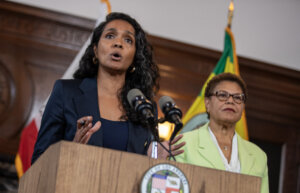
Crossing to victory
The incumbent Raman wants to supplant is fighting to retain her own Jewish backing. Bass, who attended public high school in heavily Jewish West Los Angeles, has long enjoyed a broad base of support that includes labor unions, the liberal donor class and a coalition of legacy progressive groups.
But her approval rating has plummeted since the January 2025 wildfires, which wiped out the Pacific Palisades, a wealthy and heavily Jewish enclave. Two candidates running to her right — Adam Miller and Spencer Pratt — may siphon off some votes in the primary.
Jewish leaders also said Bass failed to deliver on commitments she made after a 2024 protest outside a West Los Angeles synagogue descended into chaos. One of those commitments was to establish buffer zones outside synagogues where protesting would be legally prohibited.
Raman told the Forward she was not sure where she stood on the issue. “The idea of protesting outside a religious institution is troubling to me,” she said, “but I also have voted to uphold First Amendment rights to speak up and to protest in the past. I think that we can find a way to balance people’s needs for safety with that First Amendment right.”
Raman will want to reignite the grassroots support that propelled her candidacy in 2020. But her late entry into the mayor’s race isn’t helping.
Raman admitted she had entered the fray too late to seek most primary endorsements, a reality underlined by Councilmember Hugo Soto-Martinez — himself a DSA member — declining to switch allegiances from Bass after her announcement. And Solkovits said he was not sure whether DFI-LA would support Raman this time around. (Bass received its support in 2024, but the group sometimes supports multiple candidates in the same race.)
And her positions on Israel make up only part of the frustrations that may be lingering among her DSA peers.
Raman broke with DSA council members on Measure ULA, a so-called “mansion tax” that had been a major progressive legislation but which Raman said hamstrung multifamily housing construction. She also voted against a $2.6 billion convention center upgrade supported by Soto-Martinez and fellow DSA member Eunisses Hernandez, who represent union-heavy districts. (Raman said the city was already under huge financial pressure and could not afford it.)
If that makes it harder to rally the base that first put her in office — and replicate the massive wave of progressive turnout that got Mamdani elected in New York — Raman says she isn’t worried.
“My goals here are centered around Angelenos, their safety and their ability to thrive in a city that is deeply unaffordable and in a city that is struggling to deliver basic services,” she said. “That’s the message that I think will activate voters.”
The post She’s a Democratic Socialist who affirmed Israel’s right to exist. Can she be LA’s next mayor? appeared first on The Forward.



